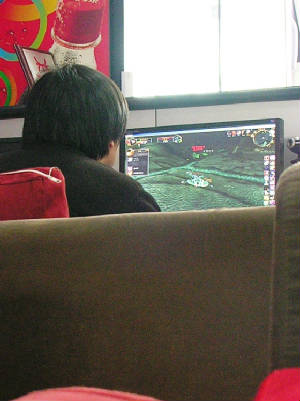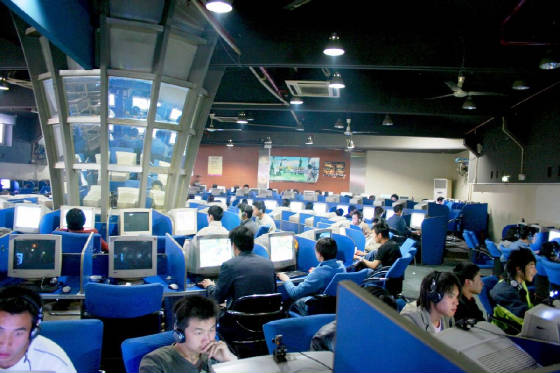|
Welcome to the Wangba

|
| The meeting place of the band of brothers |
The Wang Ba – or Internet bar – was warm and welcoming. The receptionist, a twenty-year
old woman from Shanxi, ignored the “All visitors must show a valid ID card” notice on the counter and gave me
a slip with my mima – a secret number that would enable me to log on – in exchange for two yuan, the
fee for one hour.
This place was an altogether different set-up compared with the Internet café I had visited a few weeks
ago in Yantai, Shandong. Instead of 400
terminals set out in regimented rows, hard chairs, and a smoky atmosphere you could cut with a proverbial knife, here was
the luxury end of the market: four well-separated rows of four computers, arranged in pairs; with each pair sharing a comfy
two-seater settee with big cushions. There were 9 people
in the bar; so most surfers had a settee to themselves. And, judging by their almost-horizontal postures
as they tapped their keyboards, each was determined to make the most of the plush couches. The far row of terminals
facing the wall were the only ones that couldn’t be seen from the main floor and, not coincidentally, were the only
ones to have a wall-mounted camera trained on them. Of the four surfers’ screens I could see from
my settee, three were displaying games: the teenager in front of me was on the side of good, fighting a battle against evil,
in the guise of a game called World of Warcraft; the two friends sharing a settee to his left were playing an NBA game and
a mahjong game respectively (each spending time watching the other’s screen). The NBA game seemed
liked a lot more fun; but at least the mahjong player had time to have online conversations with the three other “players”.
The young man next to me was writing a blog, tapping ferociously, linking, uploading, framing, copying, pasting, and
tapping ferociously again. Mr Li is from the local neighbourhood and comes here daily to write what he describes as his “daily thoughts about life”.
He graduated from “three-year college” with an engineering qualification, but has not held a full-time
job for more than three months in the three years since leaving college.
“I don’t
like technical things very much; I guess I studied the wrong thing at college. It’s never long before my boss
gets tired of me. “Blogging helps me get things sorted in
my mind. I can take the frustrations of daily life and turn them into something quite positive. “For
instance, I bought a yoghurt yesterday, and it was off. I tried to get my money back from the xiaomaibu
– a small kiosk selling snacks and drinks – but they said I had opened it! How silly, of course
I had to open it to find out it was off! “So
I told everyone about the unreasonable shopkeeper and of course about the brand that I had bought. That
made me feel better… I suppose you could call it revenge, but I prefer to think that I am helping
others by telling them what they should avoid… and also what they should buy… If I find something cool… that’s surprisingly good… or a great offer,
I also talk about it. The many thank-you notes… and messages of support I get back from complete
strangers… makes it all worthwhile. It’s great to know that there are so many like-minded
people out there.”
He and millions of other bloggers write from the heart and Mr Li’s
experience of a brand, or of a small corner shop, have a great influence on what his readers think. Should
the criticism of a brand, or of a person, place or thing reach a critical mass, then the resulting Internet “wave”
could result in an image crash, a boycott, or even a protest outside an embassy. Particularly so if the
“official media” decides to fan the flames of the criticism. So, then, brand stewards, as well
as countries, need to avoid upsetting people like Mr Li. In fact, the really bright ones go out of their
way to win him over my over-delivering on expectations to the extent that he becomes an advocate. A report published recently by the organisation responsible for analysing the development of the
Internet in China has cast more light on this increasingly influential group. According to their “Survey Report on Blogs in China 2007”, at the end
of November there were 47 million people in China who had written a blog. Those blogs were occupying about 73
million “blog spaces”. Approximately, then, one in every four Internet users in China has put finger to
keyboard to publish a blog. Of course many of them are what may be described as lapsed or inactive bloggers, but their
thoughts, ideas, preferences, grievances, loves and hates are still there for all to read. The really influential group, however, are people like Mr Li – who is one of 17 million
active bloggers – because their up-to-the-date musings attract a huge, hungry-for-advice readership. Obviously, all bloggers have not been created equal, so the more entertaining
Mr Li is, the more readers he gets, and the more his “advice” counts.
In other words, some active-bloggers are more attractive than others…

|
| One of the virtual army of several million |
A few weeks ago, on the provincial island of Hainan, which basks in the South China Seas, Zhang
Zilin, a six-foot-tall, 23 year-old from Shijiazhuang, the capital of Hebei province, became the first Chinese to win the
Miss World contest. Her blog, hosted
by Sina.com, received over one million hits in the first few days following her win. All brands, the yoghurt brand that offended Mr
Li included, can breath a sigh of relief, however, as no bad experiences were reported.
On the plus side, “Brand London”, where she visited shortly after receiving
the crown, enjoys pride of place on her home page. The amount of money it would have cost the British Tourist Authority to have made a similar impact – using conventional
means – on the ever-expanding group of people who have the means and inclination to take a long haul holiday, is anyone’s
guess.
Blog readers develop a rapport with their favourite bloggers to the point that the attitudes and preferences
that are expressed are bound to seep into their minds. Bloggers who pour out their worries, fears, and insecurities can build a loyal
(and caring) readership, particularly among those who are experiencing similar emotional traumas.
“It’s therapy for both of us [the blogger and the reader],”
said one young woman I spoke with in Yantai. It is clear from the several dozen articles and blogs I’ve read recently
– as well as from the many conversations I’ve had – that blogging and blog-reading are the “coping
tools” that are increasingly being used to deal with the “emotional disorientation” caused by China’s
dizzying rate of change.
The “cyber-cathartic” role of blogging also extends to people’s
love life. A few years ago, Mu Zimei became famous overnight after she blogged about her affairs with several lovers. More recently,
Zhou Qiangling (aka “Madam Rose”), a 51 year-old divorcee surprised her 24 year-old son by setting up a blog,
not to mention attracting "500,000 regular readers" by, according to the China Daily, enjoying “on-line trysts and writing about
them”. As I was leaving, an influx
of eight young men arrived and the counter was a flurry of activity.
Two of that number were first time visitors to the café
and, as well as handing over their ID card, also had to have their photo taken (with the ID card placed at the bottom of the
small camera device on the counter – presumably to cross-reference the card with the photo). One chap said that he had had
his photo taken here last week, but didn’t protest when the woman from Shanxi told him that she couldn’t find
his record and so would have to have his photo taken again.
I managed to finish a bottle of green tea during the several minutes
it took to process the courteous and very patient group at the counter. The first two to be processed, both
in their early twenties, sat on the settee I had just vacated. Within minutes, they had donned their avatars, and set
out on yet another quest to save the world, ridding it of evil doers as they went. There are somewhere in the region of 120 million gamers in China (of the 210 million Internet
users). When it comes to digital therapy, then, slaying virtual dragons rates far higher than exorcising personal
ghosts.

|
| "Mission control" Nasa-like Internet cafe in Shanghai (photo courtesy of shizukabazooka) |
|

